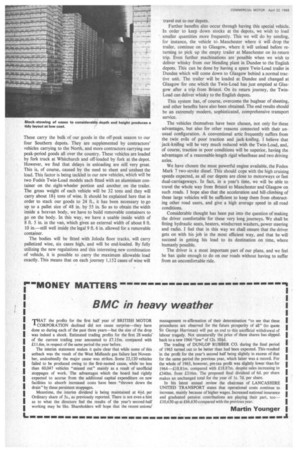BMC in heavy weather
Page 68

If you've noticed an error in this article please click here to report it so we can fix it.
THAT the profits for the first half year of BRITISH MOTOR CORPORATION declined did not cause surprise—they have done so during each of the past three years—but the size of the drop was indeed a shock. Estimated trading profits for the first 28 weeks' of the current trading year amounted to £7.15m. compared with £11.6m. in respect of the same period the year before.
The interim statement makes it quite clear that while some of this setback was the result of the West Midlands gas failure last November, undoubtedly the major cause was strikes. Some 23,120 vehicles failed to be produced owing to the first-named cause, while no less than 60,047 vehicles "missed out" mainly as a result of unofficial stoppages of work. The advantages which the board had rightly expected to accrue from the additional capital expenditure on new facilities to absorb increased costs have been "thrown down the drain" by these persistent stoppages.
Meantime, the interim dividend is being maintained at 4fd. per Ordinary share of 5s., as previously reported. There is not even a hint as to what the directors feel the results of the year's second-half working may be like. Shareholders will hope that the recent unions/
management re-affirmation of their determination "to see that these procedures are observed for the future prosperity of all" (to quote Sir George Harriman) will put an end to this unofficial withdrawal of labour tragedy. Not unnaturally the price of these shares has slipped. back to a new 1966 "low" of 12s. 10+d.
The trading of DUNLOP RUBBER CO. during the final period of 1965 turned out to be better than had been expected. This resulted in the profit for the year's second half being slightly in excess of that for the same period the previous year, which latter was a record. For the whole of 1965, however, pre-.tax profit was slightly lower than for 1964—£18.81m. compared with £18.87m. despite sales increasing to £340m. from £316m. The proposed final dividend of 6d. per share makes an unchanged total for the year of Is. 7d. per share.
In his latest annual review the chairman of LANCASHIRE UNITED TRANSPORT states that operational costs continue to increase, mainly because of higher wages. Increased national insurance and graduated pension contributions are playing their part, too— £10,630 up at £66,630 compared with the previous year.
Martin Younger




























































































































